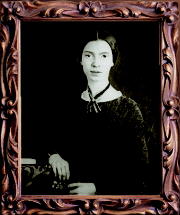 1. It's All I Have to Bring Today
1. It's All I Have to Bring Today
It's all I have to bring today,
This, and my heart beside,
This, and my heart, and all the fields,
And all the meadows wide.
Be sure you count, should I forget–
Some one the sum could tell–
This, and my heart, and all the bees
Which in the clover dwell.
2. I Taste a Liquor Never Brewed
I taste a liquor never brewed,
From tankards scooped in pearl;
Not all the vats upon the Rhine
Yield such an alcohol!
Inebriate of air am I,
And debauchee of dew,
Reeling, through endless summer days,
From inns of molten blue.
When the landlords turn the drunken bee
Out of the foxglove's door,
When butterflies renounce their drams,
I shall but drink the more!
Till seraphs swing their snowy hats,
And saints to windows run,
To see the little tippler
Leaning against the sun!
3. The Place Called Morning
Will there really be a morning?
Is there such a thing as day?
Could I see it from the mountains
If I were as tall as they?
Has it feet like water-lilies?
Has it feathers like a bird?
Is it brought from famous countries
Of which I have never heard?
Oh some scholar! Oh some sailor!
Oh some wise men from the skies!
Please to tell a little pilgrim
Where the place called morning lies!
It sifts from leaden sieves,
It powders all the wood,
It fills with alabaster wool
The wrinkles of the road.
It makes an even face
Of mountain and of plain–
Unbroken forehead from the east
Unto the east again.
It reaches to the fence,
It wraps it, rail by rail,
Till it is lost in fleeces;
It flings a crystal veil
On stump and stack and stem–
The summer's empty room,
Acres of seams where harvests were,
Recordless, but for them.
It ruffles wrists of posts,
As ankles of a queen–
Then stills its artisans like ghosts,
Denying they have been.
 5. I haven't told my garden yet
5. I haven't told my garden yet
I haven't told my garden yet,
Lest that should conquer me;
I haven't quite the strength now
To break it to the bee.
I will not name it in the street,
For shops would stare at me–
That one so shy, so ignorant–
Should have the face to die.
The hillsides must not know it,
Where I have rambled so,
Nor tell the loving forests
The day that I shall go–
Nor lisp it at the table–
Nor heedless by the way
Hint that within the riddle
One will walk today!
6. Because I could not stop for Death
Because I could not stop for Death
He kindly stopped for me;
The carriage held but just ourselves
And Immortality.
We slowly drove,
He knew no haste,
And I had put away
My labor, and my leisure too,
For his civility.
We passed the school
Where children strove
At recess in the ring
We passed the fields of gazing grain
We passed the setting sun
Or rather–he passed us.
The dews drew quivering and chill
For only gossamer, my gown;
My tippet–only tulle.
We paused before a house that seemed
A swelling of the ground;
The roof was scarcely visible,
The cornice–in the ground.
Since then 'tis centuries–and yet
Feels shorter than the day
I first surmised the horses' heads
Were toward eternity.
7. A door just opened
A door just opened on a street–
I, lost, was passing by–
An instant's width of warmth disclosed,
And wealth, and company.
The door as sudden shut, and I,
I, lost, was passing by–
Lost doubly, but by contrast most,
Enlightening misery.
8. There is a word
There is a word
Which bears a sword
Can pierce an armed man.
It hurls its barbed syllables–
At once is mute again.
But where it fell
The saved will tell
On patriotic day,
Some epauletted brother
Gave his breath away.
Wherever runs the breathless sun,
Wherever roams the day,
There is its noiseless onset,
There is its victory!
Behold the keenest marksman!
The most accomplished shot!
Time's sublimest target
Is a soul "forgot"!
9. For fear to be a king
We never know how high we are
Till we are asked to rise;
And then, if we are true to plan,
Our statures touch the skies.
The heroism we recite
Would be a normal thing,
Did not ourselves the cubits warp
For fear to be a king.
10. To Know Just How He Suffered
To know just how he suffered would be dear;
To know if any human eyes were near
To whom he could entrust his wavering gaze,
Until it settled firm on Paradise.
To know if he was patient, part content,
Was dying as he thought, or different;
Was it a pleasant day to die,
And did the sunshine face his way?
What was his furthest mind, of home, or God,
Or what the distant say
At news that he ceased human nature
Such a day.
And wishes, had he any?
Just his sigh, accented,
Had been legible to me.
And was he confident until
Ill fluttered out in everlasting well?
And if he spoke, what name was best,
What first,
What one broke off with
At the drowsiest?
Was he afraid, or tranquil?
Might he know
How conscious consciousness could grow,
Till love that was, and love too blest to be,
Meet--and the junction be Eternity?
11. A light exists in spring
A Light exists in spring
Not present on the year
At any other period.
When March is scarcely here
A color stands abroad
On solitary hills
That science cannot overtake,
But human nature feels.
It waits upon the lawn;
It shows the furthest tree
Upon the furthest slope we know;
It almost speaks to me.
Then, as horizons step,
Or noons report away,
Without the formula of sound,
It passes, and we stay:
A quality of loss
Affecting our content,
As trade had suddenly encroached
Upon a sacrament.
12. The Daisy
The daisy follows soft the sun,
And when his golden walk is done,
Sits shyly at his feet.
He, waking, finds the flower there.
"Wherefore, marauder, art thou here?"
" Because, sir, love is sweet!"
We are the flower, Thou the sun!
Forgive us, if as days decline,
We nearer steal to Thee–
Enamoured of the parting west,
The peace, the flight, the amethyst,
Night's possibility!
13. The Wind
The wind took up the northern things
and piled them in the south–
Then gave the east unto the west
And opening his mouth
The four divisions of the earth
Did make as to devour
While everything to corners slunk
Behind the awful power.
The wind–unto his chambers went
And nature ventured out–
Her subjects scattered into place
Her systems ranged about
Again the smoke from dwellings rose
The day abroad was heard–
How intimate, a tempest past
The transport of the bird.
14. An everywhere of silver
An everywhere of silver,
With ropes of sand
To keep it from effacing
The track called land.
15. Look at the horses
Tie the strings to my life, my Lord,
Then I am ready to go!
Just a look at the horses–
Rapid! That will do!
Put me in on the firmest side,
So I shall never fall;
For we must ride to the Judgment,
And it's partly down hill.
But never I mind the steeper,
And never I mind the sea;
Held fast in everlasting race
By my own choice and thee.
Good-by to the life I used to live,
And the world I used to know;
And kiss the hills for me, just once;
Then I am ready to go!
Acknowledgements
Poems by Emily Dickinson used by arrangement with the publishers and the Trustees of Amherst
College from The Poems of Emily Dickinson, Thomas H. Johnson, ed., Cambridge,
Mass.: The Belknap Press of Harvard University Press, Copyright 8 1951, 1955,
1979, 1983 by the President and Fellows of Harvard College. All rights reserved.
ARTIST NOTE REGARDING TITLES:
Emily Dickinson did not title any of her poems. She seemed to think the words were best when just speaking for themselves. Today, when her poems are published, the first line is generally the title. We have chosen to give these songs titles which reflect our musical interpretations of Emily's untitled poems. Consider these the titles to our music, not Emily's words.
---The Dorian Muse.




![]() are registered trademarks of Geofonica, Inc.
are registered trademarks of Geofonica, Inc.